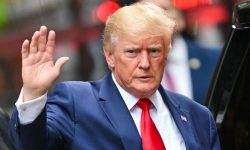The Impact of Trump’s 2024 Election Victory on the Global Economy

Donald Trump’s 2025 reelection to the U.S. president is expected to have a big impact on geopolitical and economic developments throughout the world. Protectionist trade policies and an emphasis on national interests are hallmarks of his administration’s policies, which are predicted to change international commerce, impact the current war between Russia and Ukraine, and have a domino effect on adjacent areas, including South Asia.
After winning the 2024 election, Donald Trump returns to the White House with a set of policies that are reminiscent of his earlier administration. Trump is well-known for his “America First” stance, and his policies prioritize deregulation, protectionism, and a reassessment of global partnerships. In the past, these tactics have caused notable changes in the dynamics of international economic and geopolitical relations.
The core tenet of Trump’s economic approach is the idea that tough trade measures can defend home businesses and address perceived imbalances. Imposing import duties is a common strategy used to promote homegrown manufacturing and close trade deficits. Such acts, however, may provoke trade partners to retaliate, which might escalate into trade wars with far-reaching economic consequences.
Countries all across the world have implemented a variety of tactics to deal with the difficulties posed by geopolitical conflicts and international trade. For example, despite growing nationalism, the European Union has placed a strong emphasis on cooperation and multilateralism. China, on the other hand, has chosen to increase its influence by fortifying regional ties and funding infrastructure projects out-side.
Donald Trump’s Second Term: A Shift toward Protectionism
A new age of American protectionism has begun with President Trump’s second term. In addition to threatening higher taxes on the European Union, his administration has imposed severe tariffs on imports from China, Mexico, and Canada. The goal of these actions is to exert pressure on trading partners to comply with American objectives without driving up domestic inflation too much. Experts caution that such measures may cause the world economy to become unstable and seriously hurt the economies of Canada and Mexico, possibly putting them into a recession.
Trump’s return to the president has furthered the worldwide trend away from globalization and toward nationalism, which was emphasized at the World Economic Forum in Davos. Even if the present political environment favors a transactional, zero-sum approach, discussions highlighted the necessity of multilateralism to address important issues like tax reform and climate change.
Broader Economic Implications
Global markets are now more unpredictable as a result of President Trump’s protectionist policies and the Russia-Ukraine war. Among the difficulties that firms and consumers encounter are supply chain interruptions, increased manufacturing costs, and inflationary pressures. The OECD recommends policies like windfall taxes on energy corporations to finance assistance programs, arguing that targeted financial help for low-income households might lessen certain adverse effects.
In summary, the ongoing conflict between Russia and Ukraine and the United States’ move toward protectionism during President Trump’s second term are influencing the global economy. To preserve economic stability, stakeholders everywhere must negotiate these issues through calculated policy reactions and cross-border collaboration.
Impact on the Global Economy
President Trump declared in January 2025 that significant import duties from China, Mexico, and Canada would take effect on February 1. Goods from Canada and Mexico now face a 25% tariff, while Chinese products incur a 10% tariff. In the event that European nations fail to abide by specific U.S. criteria, the administration has also hinted at the possibility of further tariffs on imports from the European Union. China has promised to protect its interests, while Canada and Mexico have promised to react strongly. According to economists, these tariffs may result in increased costs for American consumers as well as possible inflationary pressures. Following the announcement, the Dow Jones Industrial Average fell by 0.75%, indicating a negative reaction from the stock market.
Concerns over possible interruptions to international trade have been raised by these protectionist policies. It is anticipated that there will be a significant economic impact, including higher expenses for American households and possible inflationary pressures. In response, Canada and Mexico have made plans for potential retaliation actions. Free trade proponents must emphasize the advantages of free trade in the face of growing protectionism as the global trading environment grows more difficult.
Role in the Russia-Ukraine Conflict
The way that President Trump has handled the conflict between Russia and Ukraine has generated a lot of worry and conjecture. Concerned about being left out of the U.S.-Russia ceasefire talks, Ukrainian President Volodymyr Zelenskyy has called the exclusion “very dangerous.” He underlined that any talks between the United States and Russia over the current conflict must include Ukraine. Zelenskyy thinks President Trump might use sanctions and backing for Ukraine’s military to put pressure on Russia.
The Trump administration’s intentions for U.S. assistance to Ukraine are unclear, though. While some think Ukraine is already having difficulties, others have concerns about U.S. help for the country. Trump’s second term as president is expected to have challenging ramifications for Ukraine, particularly at a time when Russia is making military gains at the fastest pace since 2022.
Influence on U.S. Politics and Economy: Effects on India and Nepal
The United States is a major player in the world economy, and changes to US policies have a big impact on nations like Nepal and India. India may face difficulties as a result of increased U.S. protectionism given its strong economic links to the United States. Tariffs and a possible shift to bilateral trade agreements might upend current trade dynamics, forcing India to look for new markets and fortify its regional ties. Amidst growing protectionism and a dearth of industrialization, economists advise India to leverage policies such as “China plus One” to propel export-led growth.
Countries like India and Nepal are impacted by the political and economic actions of the United States under the Trump administration. India, which has been the United States’ top trading partner since 2021, trades a lot of commodities and services, including chemicals, textiles, machinery, and information technology. Any changes to U.S. trade policy, particularly those that raise tariffs or modify trade agreements, might have a big effect on India’s export-based economy.
Despite having less commerce with the United States than India, Nepal nonetheless views the country as an important trading partner. Nepal receives a substantial amount of its foreign exchange from the United States, mostly from the export of clothing, carpets, and travel. Nepal’s export industries may suffer from changes in U.S. trade policies, such as the introduction of new taxes or the rewriting of trade favors, which could cause financial difficulties.
The global financial markets may be more broadly impacted by Trump’s policies, which include reducing corporate taxes, deregulating industries, and renegotiating trade agreements. By fostering a competitive business climate, his economic theory hopes to entice American companies to grow overseas, particularly in developing nations like India and Nepal. His protectionist measures, however, would hinder FDI flows into other areas, which would have an impact on the growth of economies such as Nepal.
The political climate in the US is probably going to stay split. The stability of domestic economic policies may be impacted by Trump’s leadership’s potential to further polarize the country. Due to market uncertainty, his possible return might cause economic conditions to fluctuate, impacting trading partners globally. However, his populist appeal may also result in economic stimulus plans meant to revitalize industries, which may have an indirect impact on manufacturing and global supply chains.
The impact of the U.S. economy on Nepal is indisputable. Being a small, landlocked country with expanding connections to international markets, Nepal’s economy is susceptible to the decisions made by superpowers such as the United States. Reduced aid or changed conditions of trade could result from a change in U.S. trade policies, particularly under Trump’s leadership, particularly if protectionist policies limit trade. Nepal’s exports will be immediately impacted by this, especially in the manufacturing and agricultural sectors as well as the travel and tourism sector.
Furthermore, U.S. trade and defense policies may have an impact on Nepal’s relationship with India, a major regional power. India’s security capabilities have historically been strengthened by the United States, and Trump’s policies regarding military aid and defense budget may present Nepal with new chances or difficulties. Nepal could have to negotiate a more challenging regional security landscape if the United States withdraws its military assistance or presence for India.
Additionally, remittances from Nepali workers overseas, especially those in the United States, may be impacted by economic decisions made in the United States. Many Nepalese households rely heavily on remittances for their income, and changes in the U.S. economy brought about by Trump’s policies—particularly those pertaining to tax cuts and employment regulations—may have an impact on the volume and consistency of remittances sent home.
The United States’ sway over international financial organizations like the World Bank and the International Monetary Fund (IMF) is another factor to take into account. Trump’s prospective leadership could change the conditions of financial aid to underdeveloped countries like Nepal because he is a significant member of these organizations. Nepal might have to deal with more stringent requirements or longer wait times for loans or aid if Trump decides to put American interests first in these forums.
Additionally, Nepal’s economic development ambitions may be impacted by any changes in U.S. foreign aid and development assistance. Through USAID, the United States has historically made a large bilateral economic contribution to Nepal’s growth. The extent and continuity of such assistance may be impacted by any changes to U.S. policy.
Conclusion
Many aspects of the international political and economic order are expected to change as a result of Donald Trump’s comeback as president of the United States. His protectionist trade policies give countries the chance to reevaluate and realign their economic objectives, even though they may also create difficulties. The wider ramifications of this new leadership will be largely determined by how the Russia-Ukraine conflict develops and how South Asian nations like India and Nepal react.














 48 days to go for elections: Functions of returning officer
48 days to go for elections: Functions of returning officer एमाले केन्द्रीय कार्यालयमा उम्मेदवारको नाम प्राप्त
एमाले केन्द्रीय कार्यालयमा उम्मेदवारको नाम प्राप्त oday’s weather forecast
oday’s weather forecast अदालतको आदेशपछि चिकित्सक संघको निर्वाचन स्थगित
अदालतको आदेशपछि चिकित्सक संघको निर्वाचन स्थगित पर्सामा निर्वाचन प्रहरीका लागि मागभन्दा दोब्बर बढीको आवेदन
पर्सामा निर्वाचन प्रहरीका लागि मागभन्दा दोब्बर बढीको आवेदन तीन तहबीच कमजोर समन्वयले विकास योजनामा बाधा : उपाध्यक्ष श्रेष्ठ
तीन तहबीच कमजोर समन्वयले विकास योजनामा बाधा : उपाध्यक्ष श्रेष्ठ विश्वकप तयारीका लागि नेपाली क्रिकेट टोली श्रीलङ्का र भारत जाने
विश्वकप तयारीका लागि नेपाली क्रिकेट टोली श्रीलङ्का र भारत जाने आज २०८२ साल पुस ३० गते बुधबारको राशिफल
आज २०८२ साल पुस ३० गते बुधबारको राशिफल गगन-विश्वप्रकाश पाँच वर्षका लागि कांग्रेसबाट निष्कासित
गगन-विश्वप्रकाश पाँच वर्षका लागि कांग्रेसबाट निष्कासित सहमतिमै नयाँ नेतृत्व चयन गर्न कमलपोखरीमा छलफल हुँदै, गगन पनि पुगे
सहमतिमै नयाँ नेतृत्व चयन गर्न कमलपोखरीमा छलफल हुँदै, गगन पनि पुगे
प्रतिक्रिया